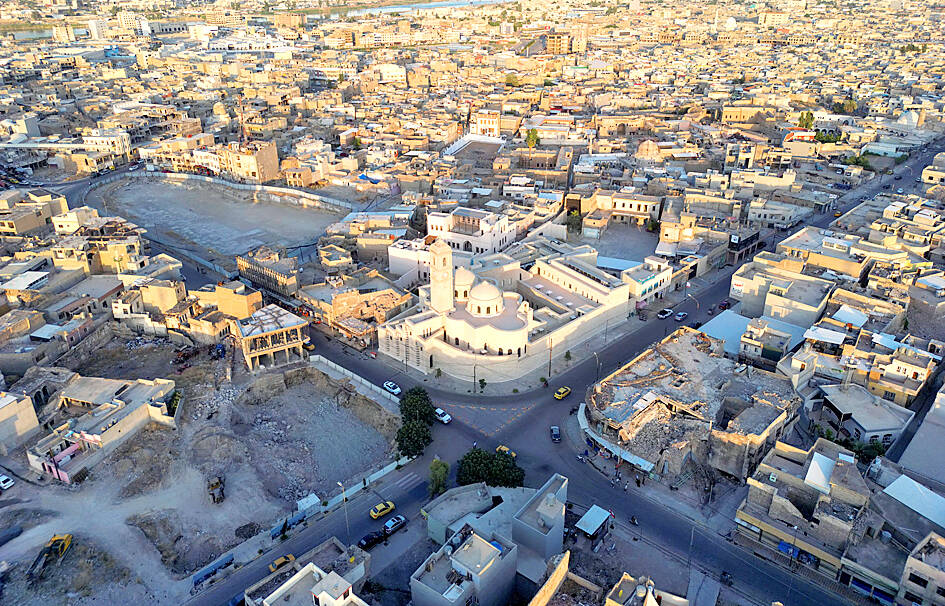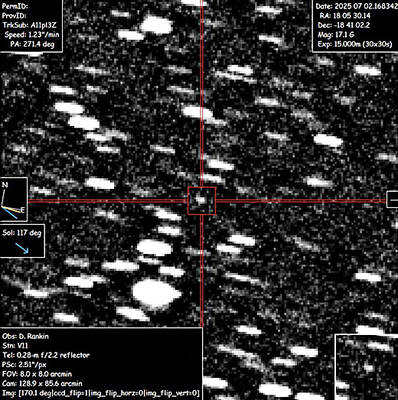It was the simple night-time act of watering flowers on his street in Mosul’s Old City that made Saqr Zakaria stop and think about just how safe this last bastion of Islamic State militants had become since it was liberated in 2017.
“I thought for a second: ‘Where am I?’” said Zakaria, who left the city in 2005, but returned to set up a cultural center, the Baytna Foundation, in 2018 at a time when thousands of bodies were still being cleared from the ruins.
The jihadist group declared its caliphate at the Grand al-Nuri Mosque just down the road after taking Mosul a decade ago, imposing an extreme form of Islam that saw them kill members of minority groups, ban music and destroy archeological sites.

Photo: Reuters
The maze of alleyways in this part of the city on the west bank of the Tigris River became a site of regular killings, kidnappings and crime with the rise of Islamist insurgents after the 2003 US-led invasion.
Much of it was pulverized, and thousands of civilians were killed, in the battle to free it.
However, despite political infighting, allegations of corruption and delayed reconstruction, life is returning on both sides of the river.
Many of the more than two dozen people who spoke to a Reuters reporter on a four-night visit to the city said they felt more secure today than at any time in the past two decades.
“Life consisted of eating and sleeping and locking your door so you’re not kidnapped or killed or blown up. We were deprived, and today we are making that up,” Zakaria said.
His foundation, housed in a traditional Moslawi home with an inner courtyard, has become a leading attraction for local and foreign visitors, including French President Emmanuel Macron in 2021.
Shortly after he spoke, an elderly man walked into the courtyard and shed tears at the sight of pictures, hung on a wall, of the city’s intellectual and cultural elite that harkened back to better days.
“This is Mosul,” said Nizar al-Khayat, a former school director in his 70s, his voice wavering. “No matter what, it remains a cultured, civilized city.”
Local officials and residents say there is a long way to go before Mosul sheds the legacy of Islamic State rule.
Rubble is still being cleared seven years after the city was liberated. Pockmarked buildings with collapsed floors and exposed rebar can still be seen around Mosul. The Old City is in ruins.
However, bridges have gone up. New restaurants have opened where patrons tuck into Lebanese cuisine and sway their heads to the nostalgic sound of Syrian tenors.
A souk and curbside cafes by the river buzz with life late into the night, formerly unthinkable in a city where people locked themselves in their homes by late afternoon.
Even as the city works to restore basic infrastructure, it is focused on expanding green areas and touristic attractions like a new riverside corniche, said Firas al-Sultan, a technical adviser to Mosul municipality.
Monuments to the city’s rich inter-faith history, like the Grand Nuri Mosque and al-Tahera Church visited by Pope Francis in 2021, are being rebuilt.

Two former Chilean ministers are among four candidates competing this weekend for the presidential nomination of the left ahead of November elections dominated by rising levels of violent crime. More than 15 million voters are eligible to choose today between former minister of labor Jeannette Jara, former minister of the interior Carolina Toha and two members of parliament, Gonzalo Winter and Jaime Mulet, to represent the left against a resurgent right. The primary is open to members of the parties within Chilean President Gabriel Boric’s ruling left-wing coalition and other voters who are not affiliated with specific parties. A recent poll by the

TENSIONS HIGH: For more than half a year, students have organized protests around the country, while the Serbian presaident said they are part of a foreign plot About 140,000 protesters rallied in Belgrade, the largest turnout over the past few months, as student-led demonstrations mount pressure on the populist government to call early elections. The rally was one of the largest in more than half a year student-led actions, which began in November last year after the roof of a train station collapsed in the northern city of Novi Sad, killing 16 people — a tragedy widely blamed on entrenched corruption. On Saturday, a sea of protesters filled Belgrade’s largest square and poured into several surrounding streets. The independent protest monitor Archive of Public Gatherings estimated the

Irish-language rap group Kneecap on Saturday gave an impassioned performance for tens of thousands of fans at the Glastonbury Festival despite criticism by British politicians and a terror charge for one of the trio. Liam Og O hAnnaidh, who performs under the stage name Mo Chara, has been charged under the UK’s Terrorism Act with supporting a proscribed organization for allegedly waving a Hezbollah flag at a concert in London in November last year. The rapper, who was charged under the anglicized version of his name, Liam O’Hanna, is on unconditional bail before a further court hearing in August. “Glastonbury,

FLYBY: The object, appears to be traveling more than 60 kilometers per second, meaning it is not bound by the sun’s orbit, astronomers studying 3I/Atlas said Astronomers on Wednesday confirmed the discovery of an interstellar object racing through the solar system — only the third-ever spotted, although scientists suspect many more might slip past unnoticed. The visitor from the stars, designated 3I/Atlas, is likely the largest yet detected, and has been classified as a comet, or cosmic snowball. “It looks kind of fuzzy,” said Peter Veres, an astronomer with the International Astronomical Union’s Minor Planet Center, which was responsible for the official confirmation. “It seems that there is some gas around it, and I think one or two telescopes reported a very short tail.” Originally known as A11pl3Z before